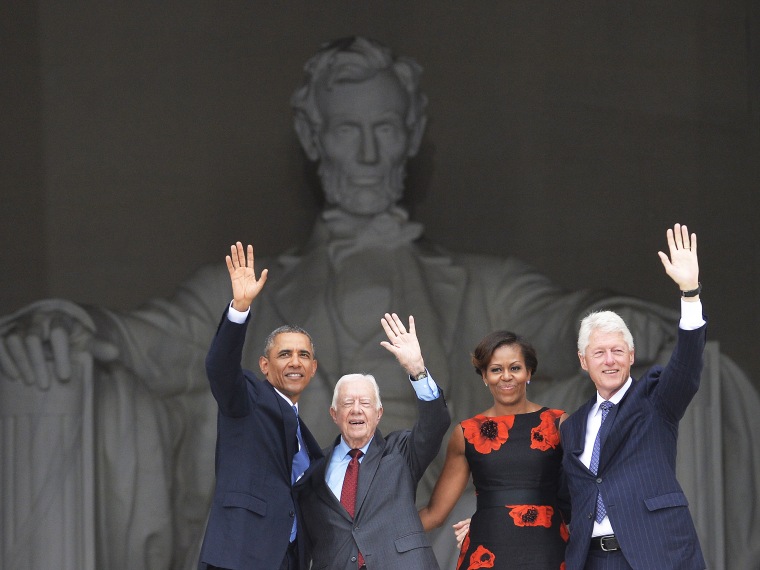As the nation celebrated the 50th anniversary of the March on Washington this week, leaders in both parties honored Dr. King's courage and leadership. But at this week's landmark event, held on the steps of the Lincoln Memorial, it was hard not to notice that no leaders from the "party of Lincoln" were there.
Many pundits on the right assumed that "liberal" organizers failed to invite Republicans. The most egregious mistake came from Fox News host Bill O'Reilly, who was forced to issue an on-air apology Thursday acknowledging that his claims that Republicans hadn't been invited were untrue.
"Now, the mistake is entirely on me," he said on Thursday's program. "I simply assumed that since all the speakers were liberal Democrats, Republicans were excluded.”
In reality, both President George W. Bush and President George H.W. Bush were invited to speak, with each citing health issues in their decision to decline. Other invitations were extended to former Governors Jeb Bush and Mike Huckabee, along with House Speaker John Boehner, House Majority Leader Eric Cantor, and Sen. John McCain. All declined, with most citing scheduling conflicts.
Representatives for Cantor, who joined Rep. John Lewis at the Edmund Pettus bridge earlier this year to honor that march for voting rights, told the Washington Post they tried to find someone to fill in for the House Majority Leader, who was speaking to oil workers in North Dakota on Wednesday, but that it didn't work out. Speaker Boehner, who was in Wyoming on Wednesday, pointed to his involvement in a Congressional-organized commemoration event earlier when asked about his absence. John McCain was at an immigration roundtable in Phoenix.
Others in the Fox media sphere complained that the Senate's only African-American member, Republican Tim Scott, was not included, but it turns out he was not invited to speak at the event after he declined the initial invitation sent to many members of Congress, according to Roll Call.
Rev. Sharpton wondered on Friday's show if perhaps Republicans avoided the event less because they didn't want to honor King, and more because they didn't want to be seen at an event where President Obama would be such a focal point.
Republicans have been known to skip Obama-hosted events. Boehner and others declined to attend a screening of the film "Lincoln" at the White House in January, and entire articles have been devoted to GOP lawmaker habits of spurning invites from Obama.
"They're worried about their district," Obama said at the time, explaining why he thought Republicans didn't want to be seen with him. "They're worried about what's going on back home."
"I think there are a lot of Republicans at this point that feel that given how much energy has been devoted in some of the media that's preferred by Republican constituencies to demonize me, that it doesn't look real good socializing with me."
The Republican party's role in civil rights achievements is undeniable. Neither the Civil Rights Act of 1964 nor the Voting Rights Act of 1965 would have become law if Republicans hadn't supported them. Today, Republican support for the Voting Rights Act is sparse--with only one Republican pushing hard to see the law fully restored after the Supreme Court's recent ruling that gutted it. Meanwhile, at least one prominent Republican Senator has even questioned parts of the Civil Rights Act.
Whether Obama-aversion, policy differences, or scheduling conflicts kept Republicans away, the optics of not attending the event don't help the GOP's rebranding efforts as they try to court minority voters.
Republican National Committee Chairman Reince Priebus said in March after the party's infamous autopsy that they were turning over a new leaf, no longer wanting to be known as "out of touch" "stuffy old men."
As Rev. Sharpton said, "Way to open that tent GOP."
